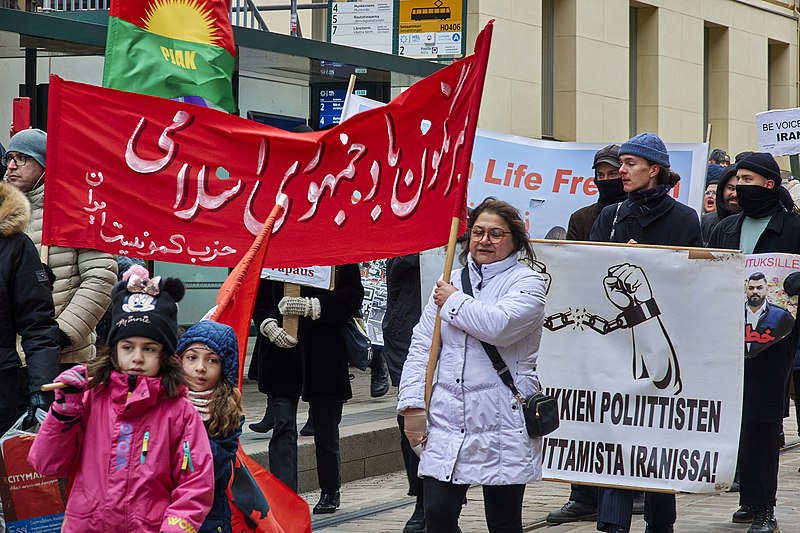Authorities in Iran are installing cameras in public spaces to identify and punish women who defy the Islamic dress code. The effort comes at a time of growing public outrage against the country’s clerical rulers.
Iranian police issued a statement published on the judiciary’s Mizan outlet on Saturday announcing that they will be installing cameras in public spaces to identify and punish women who refuse to abide by the strict dress code. The statement said the installation of cameras aims to further crackdown on the “resistance against the hijab law.” The statement added that the police “will not tolerate any kind of individual or collective behavior and action in violation of the law.”
The announcement by the police comes amidst the ire of the country’s clerical leaders over the lax rules surrounding the wearing of hijab following the anti-government protests that have been taking place since September last year. The protests were sparked by the death of Kurdish Iranian Mahsa Amini, who died in the custody of the morality police. Amini died days after she was detained for allegedly flouting the strict dress code imposed on women.
More and more women have been ditching their hijab since Amini’s death and the protests, which also led to a violent crackdown by security forces that killed dozens. Even with the brutal crackdown by security forces, women have still widely defied the hijab laws in public places, and videos of them resisting the morality police have spread all over social media.
The statement by the police on the weekend also called on business owners to observe the dress code laws while also calling on citizens to call out women who are seen without their veils.
Early this month, Iranian President Ebrahim Raisi said in televised remarks that the wearing of the hijab is “a legal matter” as the protests have persisted to this day. Tehran has blamed the unrest on its foreign adversaries like the United States and Israel.
“If some people say they don’t believe…it’s good to use persuasion…But the important point is that there is a legal requirement… and the hijab today is a legal matter,” said Raisi.



 TrumpRx Website Launches to Offer Discounted Prescription Drugs for Cash-Paying Americans
TrumpRx Website Launches to Offer Discounted Prescription Drugs for Cash-Paying Americans  U.S. Announces Additional $6 Million in Humanitarian Aid to Cuba Amid Oil Sanctions and Fuel Shortages
U.S. Announces Additional $6 Million in Humanitarian Aid to Cuba Amid Oil Sanctions and Fuel Shortages  India–U.S. Interim Trade Pact Cuts Auto Tariffs but Leaves Tesla Out
India–U.S. Interim Trade Pact Cuts Auto Tariffs but Leaves Tesla Out  Jack Lang Resigns as Head of Arab World Institute Amid Epstein Controversy
Jack Lang Resigns as Head of Arab World Institute Amid Epstein Controversy  Trump Allegedly Sought Airport, Penn Station Renaming in Exchange for Hudson River Tunnel Funding
Trump Allegedly Sought Airport, Penn Station Renaming in Exchange for Hudson River Tunnel Funding  Nighttime Shelling Causes Serious Damage in Russia’s Belgorod Region Near Ukraine Border
Nighttime Shelling Causes Serious Damage in Russia’s Belgorod Region Near Ukraine Border  China Warns US Arms Sales to Taiwan Could Disrupt Trump’s Planned Visit
China Warns US Arms Sales to Taiwan Could Disrupt Trump’s Planned Visit  U.S.-India Trade Framework Signals Major Shift in Tariffs, Energy, and Supply Chains
U.S.-India Trade Framework Signals Major Shift in Tariffs, Energy, and Supply Chains  Japan Election 2026: Sanae Takaichi Poised for Landslide Win Despite Record Snowfall
Japan Election 2026: Sanae Takaichi Poised for Landslide Win Despite Record Snowfall  Trump Lifts 25% Tariff on Indian Goods in Strategic U.S.–India Trade and Energy Deal
Trump Lifts 25% Tariff on Indian Goods in Strategic U.S.–India Trade and Energy Deal  Trump Signs “America First Arms Transfer Strategy” to Prioritize U.S. Weapons Sales
Trump Signs “America First Arms Transfer Strategy” to Prioritize U.S. Weapons Sales  TrumpRx.gov Highlights GLP-1 Drug Discounts but Offers Limited Savings for Most Americans
TrumpRx.gov Highlights GLP-1 Drug Discounts but Offers Limited Savings for Most Americans  Trump Endorses Japan’s Sanae Takaichi Ahead of Crucial Election Amid Market and China Tensions
Trump Endorses Japan’s Sanae Takaichi Ahead of Crucial Election Amid Market and China Tensions  Trump Allows Commercial Fishing in Protected New England Waters
Trump Allows Commercial Fishing in Protected New England Waters  Ohio Man Indicted for Alleged Threat Against Vice President JD Vance, Faces Additional Federal Charges
Ohio Man Indicted for Alleged Threat Against Vice President JD Vance, Faces Additional Federal Charges  U.S. Lawmakers to Review Unredacted Jeffrey Epstein DOJ Files Starting Monday
U.S. Lawmakers to Review Unredacted Jeffrey Epstein DOJ Files Starting Monday 































